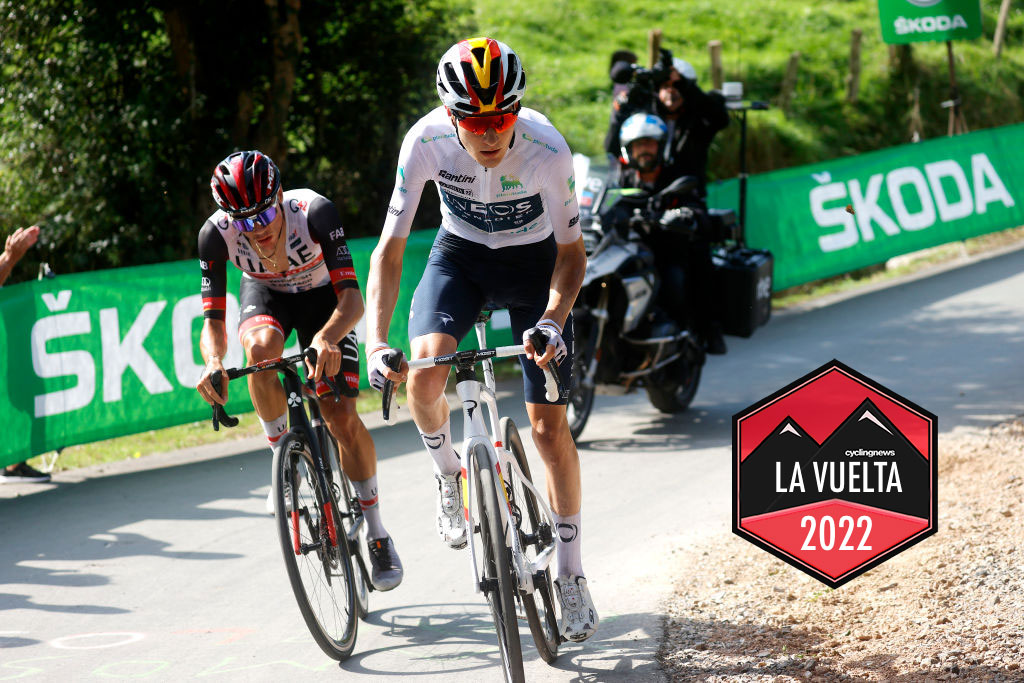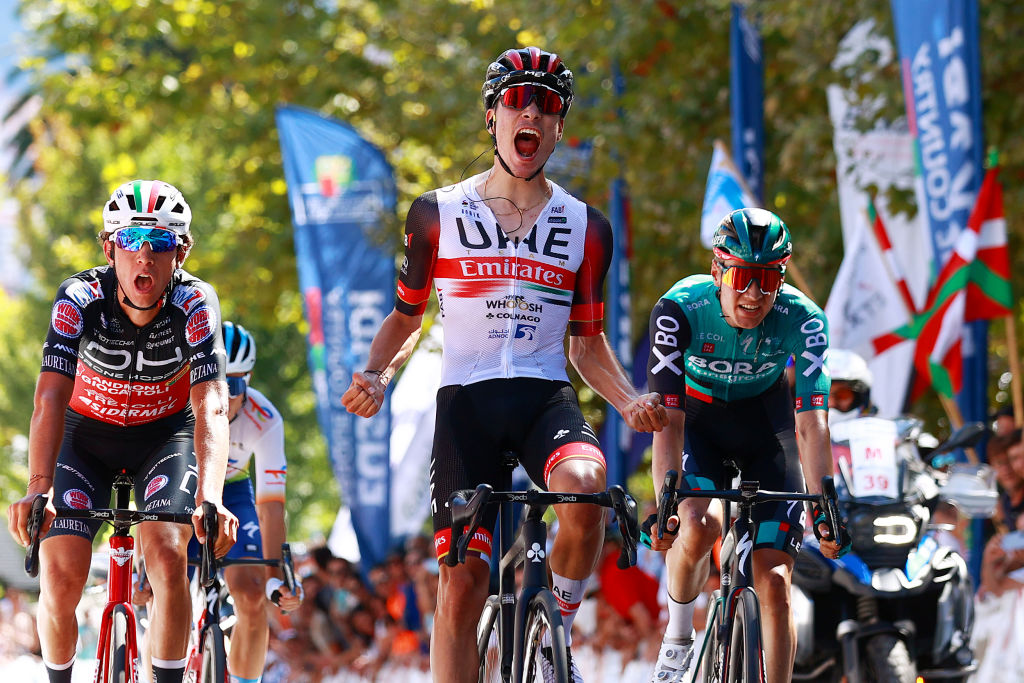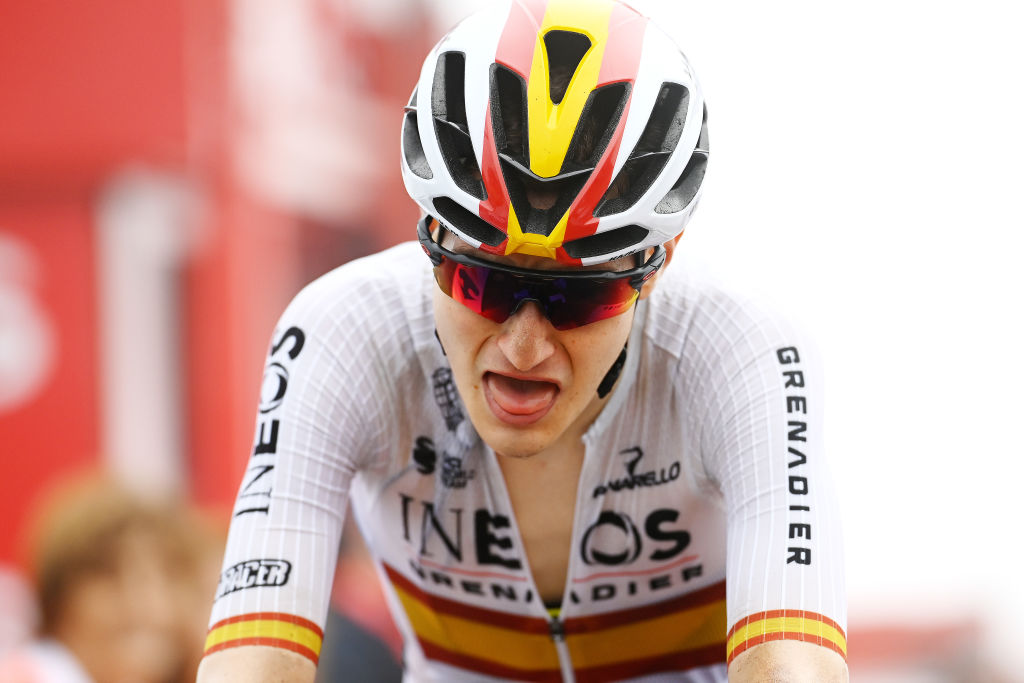Rodríguez and Ayuso lead Spain's next generation of Vuelta a España contenders
Ineos and UAE young talents impress as Valverde nears retirement

The presence of Juan Ayuso and Carlos Rodríguez in the Vuelta a España this year is producing a sense of optimism among Spanish cycling fans.
Spain has already broken its 122-stage victory drought with two wins in three days and Enric Mas (Movistar) is currently ‘best of the rest’ in the GC battle but it is the strong overall performances by Ayuso and Rodríguez that has boosted local morale for the mid-to-long term future of Spanish Grand Tour racing.
“They remind me of when I got the Vuelta podium finish in 2018, it’s great to see how well they are doing, it’s very encouraging for Spanish cycling,” Mas says.
Rodríguez (Ineos Grenadiers) and Ayuso (UAE Team Emirates) are certainly punching above their weight in a way which parallels Mas’ second place Madrid and stage win four years. Currently lying fourth and fifth overall, both are racing their first Grand Tour.
At 19, Ayuso is the youngest rider in the Vuelta since Eduardo Chozas 42 years ago. Rodríguez, who turned pro in 2020, is just over a year older than Ayuso.
“Juan is young and has not got huge amounts of experience yet, but he’s got huge qualities as a rider,” UAE Team Emirates sports director Joxean Fernandez Matxin told Cyclingnews.
“We already changed his program and brought his Vuelta participation forward by a year, and we’ve done that because in his first World Tour race (Volta a Catalunya) he already finished fifth, despite being there to help [Joao] Almeida, and in his second [the Tour de Romandie], he was fourth. Then in the third [Criterium du Dauphine], he was eighth but had to abandon because he got sick.”
Get The Leadout Newsletter
The latest race content, interviews, features, reviews and expert buying guides, direct to your inbox!
“So here he is in the Vuelta. He recently won Getxo ahead of [Wilco] Kelderman (Bora-Hansgrohe) and he’s a rider who can climb well, do really good time trials and who’s also very good in the sprints.”
Matxin says that his Portuguese teammate and team leader João Almeida acts as the lightning bolt for taking the pressure off Ayuso’s shoulders.
“Joao is the leader here too, and every day we just have to appreciate what Juan gives us, but not demand anything more than that. He is here to learn,” he says.

Just a few seconds apart
Rodríguez is on a remarkably similar trajectory to Ayuso in the Vuelta so far, with just three seconds separating the two on GC. Rodríguez lies fourth overall, 2:33 down on Evenepoel, with Ayuso fifth at 2:36.
Rodríguez's progress has been more gradual compared to Ayuso, having turned pro in 2020 but is still very impressive, his rise towards the upper rungs of the hierarchy is remarkably fast.
His first season that was drastically curtailed by the COVID-19 pandemic but the Spanish National Champion’s jersey this June, and a notable stage victory in the Itzulia this April, indicated his talents before the Vuelta.
“Carlos never stops surprising us,” Xabier Artetxe, Ineos Grenadiers race coach told Spanish TV on Sunday evening, shortly after Rodríguez had secured his third ninth place in a row on the race’s first three summit finishes at les Praeres.
“But this is the first Grand Tour he’s done so it would be rash to say this or that will happen for sure.
“When we designed his career route plan when he came to the team three years ago, the idea was what we’ve done. He’d spend two years getting used to the WorldTour and then in the third year, take part in the Vuelta a España.”
One of four Grand Tour debutants for Ineos Grenadiers this year, Artetxe says it’s important to keep a sense of perspective.
“We know that there are top riders who get burned out in the third week,” the team coach said. “But to be 21 and running fourth in the overall, right now, really we can’t ask for more. Anything that comes after this will be a bonus.”
Anything could happen in time trial ‘race of truth’ in Alicante but the chances of the two remaining so close together overall following a 30-kilometre time trial are logically slim. However when it comes to predicting how well they will fare, Ayuso and Rodríguez both have solid, if logically limited, references points at WorldTour level and before. Both are former Junior Spanish national time trial champions.
Rodríguez has already clinched a bronze in the same category at senior level back in 2021. Ayuso, on the other hand, has better WorldTour time trial results so far, with an eighth in Romandie and 10th in the Dauphine this year.
However, as their team management is constantly underlining, neither is pushing for a particular overall GC target early in their respective careers.
“Right now I’m not even beginning to think about winning the Vuelta,” Ayuso said on Monday’s rest day. “There’s so much ahead of me and I’m doing this all on the day by day.”
“If I were to start imagining that I did get on the podium or win and I didn’t do it, I’d end up finishing the race with a bad taste in my mouth and that’s just not right.
“I’m ambitious and if I can be up there, then I’ll try. But I didn’t start this race with a clear objective, because this is my first Grand Tour.”
Rodríguez echoed Ayuso’s words saying that he is very satisfied with his results so far and that rather than push for a top GC placing come what may, his main goal is to enjoy the Vuelta and see what happens.
As for the rider just a year older than Rodríguez and already leading the Vuelta, he said: “Remco has proved so far that he’s on a different level.
“Hopefully, in the next few weeks, we can work on closing the gap and fight for as high a position as possible. In any case, I didn’t expect to be where I am overall, so I’m very happy with what I’ve done so far.”
A new Spanish rivalry

The history of cycling is littered with examples of bitter divisions between top riders from the same country who are successful in the same kinds of races at the same time. But Ayuso insists that there is no kind of underlying antagonism or ill-will between him and his compatriot.
“With Carlos there’s rivalry, respect and friendship. We’ve been competing together since we were ‘cadetes’ [the 15-16-year-old category in Spain] every weekend. I’m always very happy for him when he achieves something important because he’s a naturally friendly kind of guy,” Ayuso said.
Curiously enough, quite apart from shining in their home Grand Tour, both riders will find themselves on very familiar terrain this week.
Ayuso has lived in the Valencia region since 2010 in the nearby town of Javea, close to where today’s time trial is held, while Rodriguez grew up in the Andalusian coastal town of Almunecar so knows the stage 15 ascent to Sierra Nevada and the roads of stage 12 along the edge of the Mediterranean very well.
“Hopefully it will give me some extra energy, I would appreciate that, it would come in handy”, Rodríguez said with a touch of good humour on Monday.
“Also knowing the roads a little bit can be an advantage, knowing where you have to be in the front and so on."
As for young riders doing so well in their first Grand Tour, as Matxin points out, the modern-day trends in cycling suggest this is a phenomenon that is here to stay.
“Every year, it's less and less unusual to have these young riders up there. Don’t forget what Tadej Pogacar was doing at 19 and that the race leader here is a certain Remco. We have to stop being surprised," he told Cyclingnews.
No matter what happens between Alicante and the fish of the Vuelta in Madrid, Spanish cycling fans can start celebrating a re-emergence of young racers from their country at the highest level of the sport.
That this is taking place in the same Vuelta where a rider who has flown the flag for Spain so long in Grand Tours like Alejandro Valverde is racing his final three-week race is, obviously, a complete coincidence. Yet the symbolism of it all could hardly be clearer.
Alasdair Fotheringham has been reporting on cycling since 1991. He has covered every Tour de France since 1992 bar one, as well as numerous other bike races of all shapes and sizes, ranging from the Olympic Games in 2008 to the now sadly defunct Subida a Urkiola hill climb in Spain. As well as working for Cyclingnews, he has also written for The Independent, The Guardian, ProCycling, The Express and Reuters.
